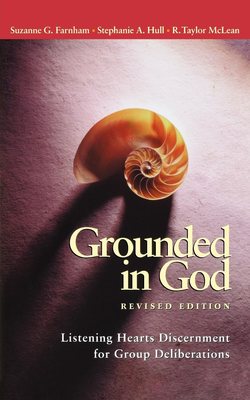Читать книгу Grounded in God, Revised Edition - Stephanie A. Hull - Страница 8
На сайте Литреса книга снята с продажи.
ОглавлениеONE
Spiritual Discernment: Its Meaningand Value for Group Meetings
When the day of Pentecost had come, they were all together in one place. And suddenly from heaven there came a sound like the rush of a violent wind, and it filled the entire house where they were sitting. –Acts 2:1–2
Imagine a church on a breezy spring day, its doors and windows opened wide to let the wind flow through. So it is when we come together as God's people with the doors of our hearts and minds open–our eyes as windows raised to see what God will show us, our ears open to hear what God may say. It is then that the wind of the Spirit can sweep into our midst to make Pentecost a reality in our life together.
God knows our deepest potential, sees the hidden complexities of our circumstances, comprehends our situation in relation to the larger picture, and grasps the broader implications of our plans. Discernment1 is our effort to tap into the flow of this divine wisdom.
In classical spirituality, discernment means distinguishing God's Spirit from other spirits that are present in a given time and place–such as the spirit of a nation, the spirit of the times, the spirit of competition. To put it another way, discernment is distinguishing the voice of God from other voices that speak to us: the voice of our parents echoing from years past, the voices of friends, voices of urgency or fear. These voices are neither bad nor good in and of themselves. God often speaks to us through them. But, if followed indiscriminantly, such voices can dominate us and lead us along a wrong path.
Discernment is a prayerful, informed, and intentional attempt to sort through these voices to get in touch with God's Spirit at work in a situation and to develop a sense of the direction in which the Spirit is leading. Discernment is more a journey than a destination. We may not find answers for all our concerns, but we can be receptive to God's presence as we ponder the questions.2
Sound rational analysis based on the best available information is crucial to good discernment. Yet spiritual discernment goes beyond the analytical to engage our senses, feelings, imaginations, and intuition as we wrestle with issues. It often points toward a decision, but it is not problem-solving. The goal of our discernment efforts is to find the mind of Christ.3 As such, it is the central component of decision-making for those who would have their lives grounded in God.
Discernment is more than saying prayers that ask God to guide us in rational consideration of matters. It is a mode of prayer that involves opening our entire selves to the working of the Holy Spirit. It bids us to let go of preconceived ideas so that we can be open to new possibilities with a readiness to view things from new perspectives. Discernment beckons us to be still and listen with the ear of our heart. It draws us into alignment with God.
Discernment is central to doing God's work. To serve God, we must constantly be alert to the presence and guidance of the Holy Spirit. Without God, we can do nothing. “Those who abide in me and I in them,” said Jesus, “bear much fruit, because apart from me you can do nothing” (Jn. 15:5).
In group deliberations, discernment involves coming together with open hearts and open minds to seek God's wisdom around issues important to the community. The first order of business is to become attuned to God's presence within and among those assembled.
Groups that seek discernment when they have business to do and decisions to make often find that their meetings become more energized and productive. The priorities of the meeting shift. Those gathered grow in faith and in love for one another while addressing the issues at hand. When those present center in God and listen deeply, their varying needs and divergent views can move from discord to concord. Rather than entering into a contest with factions singing competing tunes, the group as a whole can discover a true harmony, satisfying for all.
Spiritual discernment differs from other kinds of discernment because it is grounded in a conviction that the Holy Spirit is an active presence and, when in a group, the leading party in the proceedings. Christ is present at the center of each person and alive in the group–speaking, forming, and touching–waiting to be heard and recognized. Those assembled want to let go of barriers, both individually and collectively. They want the Spirit to guide them in shaping an issue so that it reflects what is important to God. The Spirit works as leaven that permeates the mixture, transforming the ingredients into the bread of life.
Issues of seemingly great import can become insignificant when measured against our relationship with God. For example, when a man asked Jesus to tell his brother to divide the family inheritance with him, Jesus shifted the perspective to the problem of greed, pointing out that one's life does not consist in the abundance of one's possessions. He then told a parable that warned against storing up treasures for oneself without being rich toward God (Luke 12:13). Engaging Jesus in dialogue moved the discussion from a perfectly logical consideration of property rights to the importance of putting our relationship with God first. Such reordering of priorities enables a group to be more useful in the Lord's service.
The kingdom of heaven is like yeast that a woman took and mixed in with three measures of flour until all of it was leavened. –Mt. 13:33
